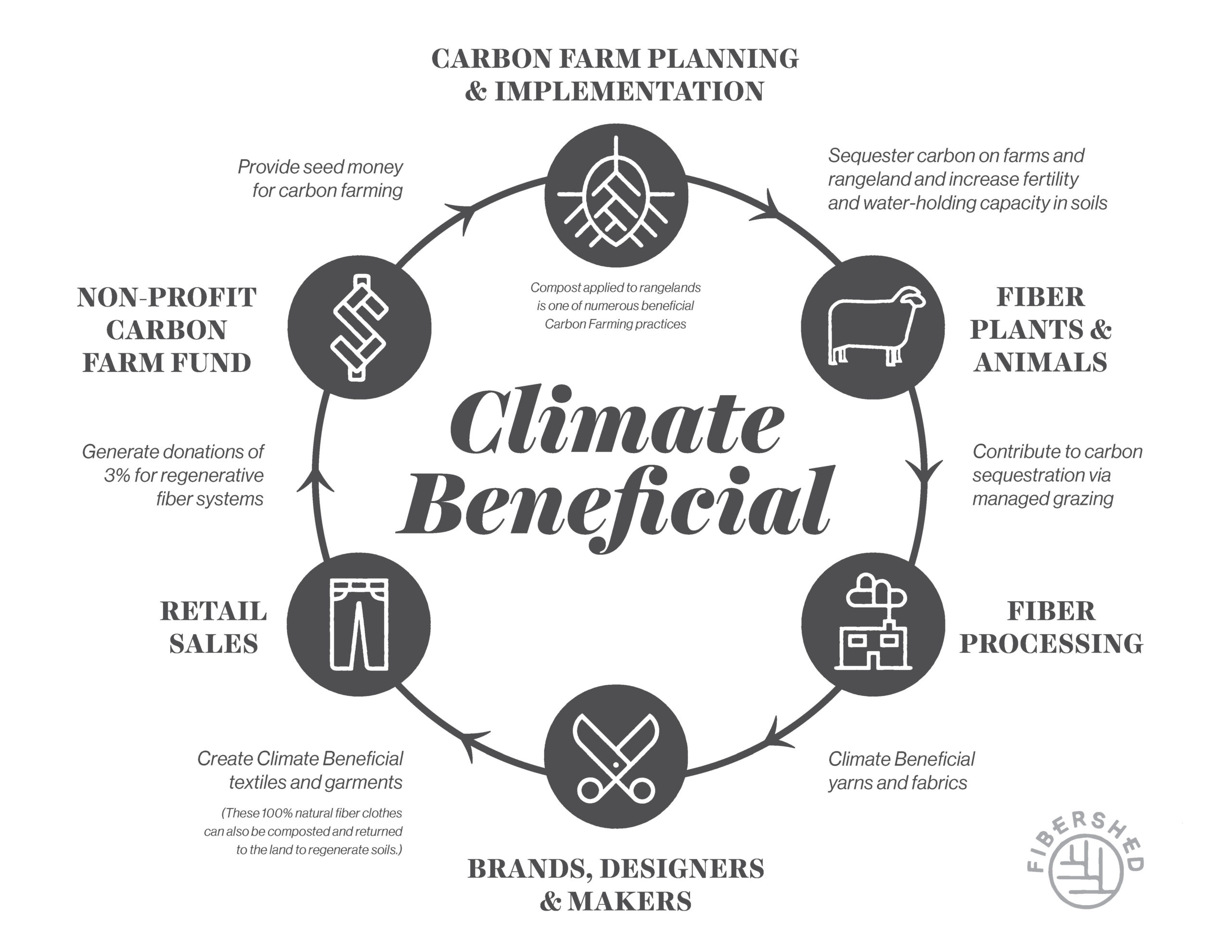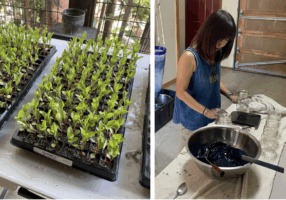Climate Beneficial™ Fiber
Verified by Fibershed
![]()
Our clothing can be a carbon sink
Natural fibers like wool, cotton, alpaca, and flax linen can be grown and raised in ways that maximize the drawdown of carbon from the atmosphere to help restore ecosystem health and stabilize our climate.
Fibershed’s Climate Beneficial™ Verification program and label supports farmers and ranchers in landscape level stewardship that centers their work to build healthy soil.
By connecting producers with designers and markets that value ecosystem services, we can grow materials and supply chains rooted in verified practices that:
- Increase Soil Organic Carbon levels
- Enhance biodiversity by providing habitat for pollinators, birds, and many species
- Improve the water-holding capacity of the soil
- Restore healthy ecosystems, from the soil microbiome to nutrient cycles
- Provide measurable climate benefits, quantified by open-source data tools
Choosing Climate Beneficial verified fiber connects your garment or durable good directly to practices that regenerate soil carbon, and so much more.
Wool
California produces nearly 3 Million pounds of wool per year, thanks to sheep grazing upon the vegetation of rangeland, pasture, perennial and annual cropland systems. From large ranches to backyard homesteads, Climate Beneficial™ Wool has engaged over 55 producers in the Northern California Fibershed network.
Wool production pairs well with time-honored landscape management practices that have been scientifically modeled to measure carbon drawdown: click here to learn more and connect with producers or products.
Source Climate Beneficial Wool
Climate Beneficial™ Verified site is a holistic verification system that enables farm-traceable connectivity—creating transparent, regenerative impacts to ecosystems and U.S. farming communities.
Cotton
Flowering cotton fields are part of an annual agricultural cycle of food and fiber production in California. With more than 250 Million pounds of white cotton produced annually in the Golden State, as well as naturally colored Colorganic® cotton, there is a major opportunity to regenerate soil and water health. Fibershed is currently partnering with farmers and researchers to understand how carbon farming practices can be incorporated into cotton landscapes: click here to learn more.
Source Climate Beneficial Cotton
In 2020, Fibershed and its partners formed the California Cotton & Climate Coalition (C4), in response to both farmers interested in on-farm scientific research on practices to prioritize soil carbon in cotton growing systems, and companies interested in Climate Beneficial™ Cotton sourced in our “backyard” – California’s Central Valley. Companies participating in the coalition are paying a premium for cotton and a coalition fee for collaborative precompetitive textile development, storytelling, and educational services. A premium cotton price allows on-farm changes to be economically viable and provides an incentive for future acreage transition to these soil building, climate-benefitting farming practices. To learn more or to join the coalition, visit Climate Beneficial™ Verified
Alpaca
Soft and luxurious Alpaca fiber is most frequently raised on small to mid-scale farms in California. Northern California Fibershed Producers who are participating in our Climate Beneficial program can be found by visiting our producer directory page and exploring the filters on the member map.
Fibershed Affiliate Network member NY Textile Lab has developed a local Climate Beneficial verification for the Hudson Valley of New York State, with several participating Alpaca producers.
Flax & Hemp
Bast fibers including flax and hemp produce strong, breathable fabrics from sturdy plants. The Chico Flax Project is piloting Climate Beneficial Transitional verified flax by incorporating carbon farming practices into their demonstration farm in the Northern California Fibershed region.
Fibershed currently works with partner organizations in the Southwest and Southeastern United States to trial and document hemp production and processing possibilities: click here to learn more about hemp research.

Join Us In Landscape-Level Change
Start your journey into Climate Beneficial Verification: fiber and dye producers are invited to join our Northern California Producer Network and ask for more information about the Climate Beneficial pipeline
Support a resilient climate and ecosystem restoration with a contribution to the Carbon Farm Seed Fund, which goes directly to on-farm practices.
“Climate Beneficial” is a registered trademark of Fibershed. Participating producers, brands, and designers can find Fibershed’s use guidelines here: Climate Beneficial Blending and Supply Chain Parameters.
Photos by Paige Green



